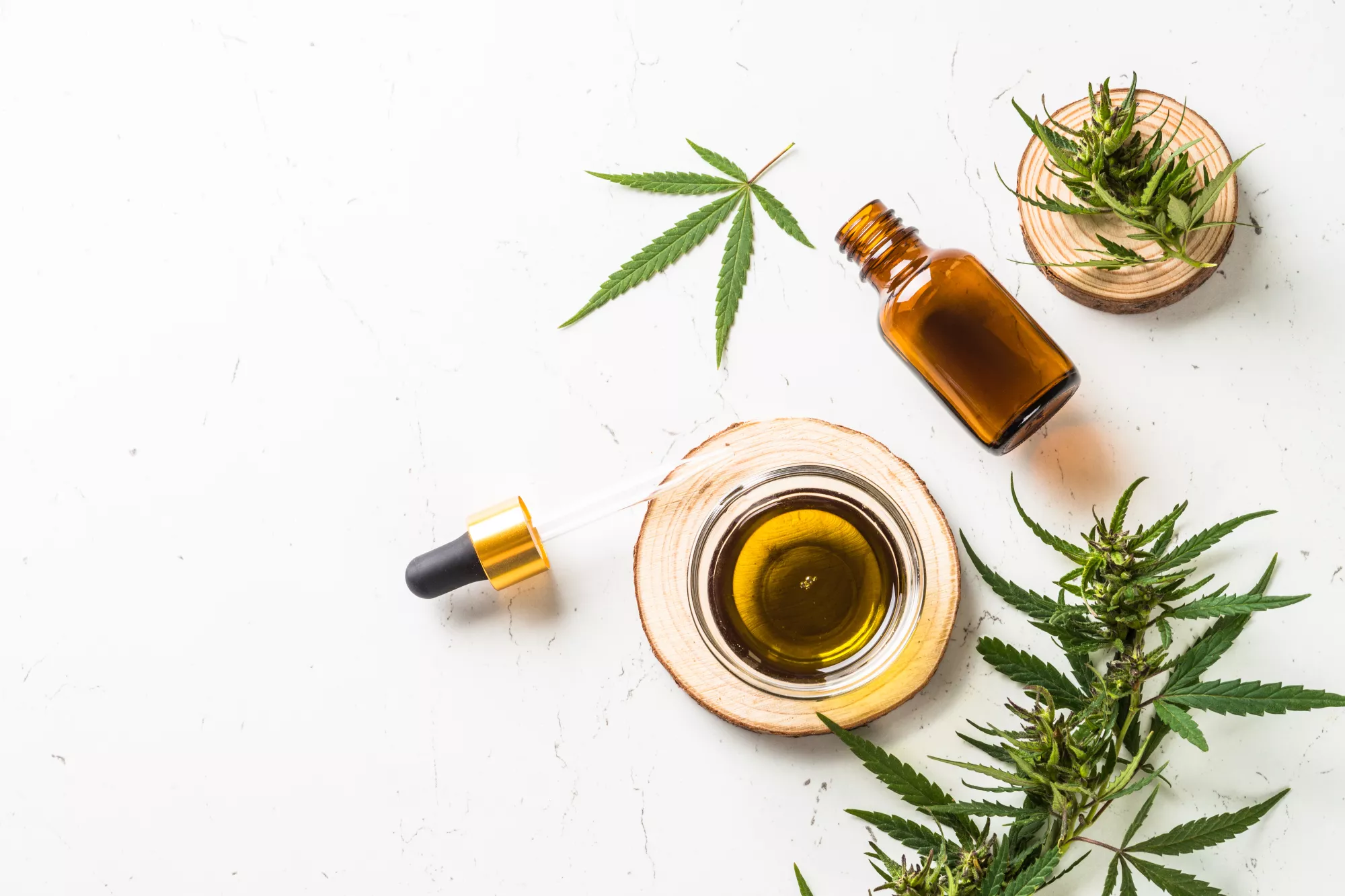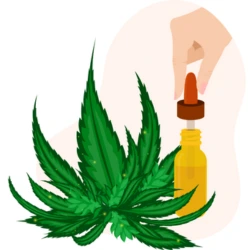
TABLE OF CONTENTS
As the United States continues to relax legal constraints on cannabis, CBD extract is becoming one of the nation’s most talked-about natural products. In fact, in 2022 alone, CBD product sales in the United States exceeded $4.1 billion dollars. [1]Statista. “Dollar sales of cannabidiol (CBD) products in the United States from 2022 to 2026“. Accessed December 1, 2023. So, with the CBD industry still in its early years, many entrepreneurs are now running to open CBD businesses.
In 2018, the Farm Bill made hemp production legal, but only if it is under 0.3%. [2]Brookings. “The Farm Bill, hemp legalization and the status of CBD: An explainer“. Accessed December 1, 2023. However, CBD regulation isn’t uniform across all fifty states, meaning that businesses must comply with local laws while manufacturing or distributing CBD products. If not, you’ll run the risk of losing the ability to process payments for your business altogether.
This guide explores CBD, the differences between hemp and marijuana, important details on the 2018 Farm Bill, and the legality of purchasing and selling CBD in all fifty states—let’s get started!
What Exactly Is CBD?

Cannabidiol (CBD) and THC are both categorized as cannabinoids. The cannabis plant contains more than 113 cannabinoids, with THC and CBD being the most prevalent. So, what’s the difference between the two? Essentially, THC contains a compound responsible for psychoactive/euphoric effects while CBD does not. On the other hand, CBD is one of the primary extracts from cannabis plants, many Americans use it as a dietary supplement for chronic pain and other health-related reasons.
While research into CBD is limited due to its previous illegal status, evidence suggests the extract may provide health benefits and treat specific conditions. However, because of the lack of high-quality research and evidence, there is no definitive conclusion about the health advantages of CBD. Let’s explore some benefits gaining more popularity below:
- Epilepsy: The FDA has approved a CBD product for treating epilepsy. The drug EPIDIOLEX treats patients for seizures related to Lennox-Gastaut syndrome.
- Anxiety: While conclusive evidence about CBD’s impact on anxiety remains unavailable, some research suggests the medication helps decrease anxiety and improve sleep quality.[3]National Library of Medicine. “Cannabidiol in Anxiety and Sleep: A Large Case Series“. Accessed December 1, 2023.
- Pain: Clinical trials show a range of outcomes for CBD and pain; while some result in placebo-equivalent effects, others show CBD to be highly effective at treating various types of pain.[4]National Library of Medicine. “A Balanced Approach for Cannabidiol Use in Chronic Pain“. Accessed December 1, 2023.
Considering the severity of the health issues listed above, it’s always crucial to source CBD products from a trusted supplier.
What’s the Difference Between Hemp and Marijuana?
While hemp and marijuana are discussed separately, they are in fact different species of the same plant, Cannabis Sativa. The primary difference between hemp and marijuana is the THC content. If the THC content is 0.3% or less, the plant is considered hemp, and if the THC content exceeds 0.3%, it’s considered marijuana.
THC, or tetrahydrocannabinol, is one of the primary psychoactive components of the cannabis plant. When THC levels are elevated, the plant is more likely to cause a “high” when it’s consumed. However, as the cannabis plant can be grown with reduced THC levels, like in the case of the hemp plant, it became important to identify plants with lower THC levels that won’t create mind-altering responses. This form of low-THC cannabis can be used to create CBD products, clothing, textiles, paper, and a range of other products unrelated to marijuana use.
So, why is 0.3% the decisive number when it comes to distinguishing hemp and marijuana? While the figure itself isn’t tied to any specific scientific concepts, THC concentrations of 0.3% and under aren’t likely to get you high. Considering the number is relatively arbitrary, the definition of hemp and marijuana could change again in the future.
What Is The 2018 Farm Bill?
The 2018 Farm Bill, formally known as the Agriculture Improvement Act of 2018, provides a continued legal framework for farming, nutrition, and other related spaces. One of the most prominent elements of the law involved removing hemp that is below 0.3% THC from the scheduled drug lists, making it federally legal.
The new definition of hemp is as follows:
The plant Cannabis sativa L. and any part of that plant, including the seeds thereof and all derivatives, extracts, cannabinoids, isomers, acids, salts, and salts of isomers, whether growing or not, with a delta-9 tetrahydrocannabinol concentration of not more than 0.3 percent on a dry weight basis. [5] 2018 Farm Bill. “Subtitle G—Hemp Production“. Accessed December 1, 2023.
This law makes it possible for businesses around the country to produce CBD and other hemp-related products.
While the 2018 Farm Bill receives a lot of attention for its approach to hemp farming, there are many other parts of the law. The 2018 Farm Bill also provides significant support and guidelines for several other farming sectors; including agriculture research, trade promotion, and more.
Is CBD Federally Legal?
Federally, the manufacturing and distribution of CBD are legal, as long as it complies with the restrictions outlined in the 2018 Farm Bill. As previously discussed, the 2018 Farm Bill mandated all cannabis with 0.3% THC content or less be considered hemp. Cannabis exceeding this THC threshold is classified as marijuana, which is a Schedule 1 drug in the United States (although it is legal in some states).
So, what does this mean for CBD in the United States? As long as your CBD comes from hemp, it is federally legal, but CBD derived from marijuana is not. With this being true, much of the substance’s regulation occurs at the state level. This means that starting a CBD business will require a full understanding of cannabis and hemp laws in your individual state.
Is CBD Legal in All States?
While hemp is now legal at a federal level, some states are yet to follow suit. The difference between state and federal laws in the U.S. makes it challenging to distribute CBD products, so understanding your local state laws is essential for operating your business legally.
Some states also allow marijuana consumption, regardless of THC content, while others permit marijuana for medical purposes. Therefore, CBD under 0.3% concentration is legal in some states, and CBD products exceeding this threshold are also permissible in others.
Below, let’s explore each state’s CBD laws:
Alabama
The state now allows for hemp production under the 0.3% limit in Alabama—this threshold is strictly monitored. It must be for medicinal purposes if you want to purchase a CBD product exceeding the 0.3% threshold.
Alaska
In Alaska, CBD products are fully legal.
Arizona
In Arizona, CBD products are fully legal.
Arkansas
In Arkansas, if you want CBD products exceeding the 0.3% limit, you must have a medical cannabis license.
California
In California, CBD products are legal. However, CBD edibles from hemp are illegal, whereas CBD edibles from cannabis are legal. There appear to be efforts to overturn this law, as it creates confusion around the legality of specific CBD products in the state. This law also seems counterintuitive, given California’s relaxed approach to marijuana and CBD consumption.
Colorado
In Colorado, CBD products are fully legal.
Connecticut
In Connecticut, CBD products are fully legal.
Delaware
In Deleware, you must obtain a medical cannabis license to get CBD products exceeding the 0.3% threshold.
Florida
In Florida, CBD and hemp products are legal so long as they contain less than 0.3% THC content. CBD oil must be sourced from hemp.
Georgia
For cannabis-sourced CBD oil, the user must have a medical cannabis license, and the product must contain equal contents of CBD and THC (the overall THC concentration must not exceed 0.5%).
Hawaii
In Hawaii, CBD and hemp products are legal so long as they contain less than 0.3% THC content. CBD oil must be sourced from hemp.
Idaho
Idaho allows for CBD, but there must be no THC content in the product (0% THC). This rule makes Idaho one of the strictest regions for CBD products.
Illinois
In Illinois, CBD products are fully legal.
Indiana
In Indiana, CBD products are legal so long as they contain less than 0.3% THC content.
Iowa
In Iowa, a medical cannabis license is required for cannabis products exceeding the 0.3% THC threshold.
Kansas
Kansas is another state with strict CBD laws—CBD products are illegal if they contain traces of THC. However, if you have a medical license, you can obtain CBD oil with traces of THC as long as the concentration does not exceed 0.5%.
Kentucky
In Kentucky, CBD products are legal so long as they contain less than 0.3% THC content. CBD oil must be sourced from hemp.
Louisiana
In Louisiana, you must have a medical cannabis license to obtain cannabis-sourced CBD products. However, hemp-sourced CBD with 0.3% THC content or less is legal in the state.
Maine
In Maine, CBD products are fully legal.
Maryland
In Maryland, cannabis-derived CBD products are only available to individuals with a medical cannabis license. However, hemp-sourced CBD products complying with federal laws are legal.
Massachusetts
CBD products are fully legal in Massachusetts. Additionally, THC products exceeding the 0.3% THC threshold are also legal for individuals 21 and older. Individuals between 18 and 20 require a medical cannabis license for CBD with a THC concentration exceeding the 0.3% limit.
Michigan
In Michigan, CBD products are fully legal.
Minnesota
In Minnesota, CBD products are legal so long as they contain less than 0.3% THC content. If you want cannabis-sourced CBD products, you must have a medical cannabis license.
Mississippi
In Mississippi, hemp-sourced CBD products with 0.3% THC or below are legal. However, if you want cannabis-sourced CBD products, you must have a medical cannabis license, and you must obtain the CBD product from the University of Mississippi. Likewise, the CBD product’s THC concentration cannot exceed 0.5%.
Missouri
In Missouri, if you want CBD products exceeding the 0.3% THC threshold, you must have a medical cannabis license.
Montana
In Montana, CBD products are fully legal.
Nebraska
In Nebraska, CBD products are legal so long as they contain less than 0.3% THC content. CBD oil must be sourced from hemp.
Nevada
In Nevada, CBD products are fully legal.
New Hampshire
In New Hampshire, cannabis-sourced CBD products require a medical license; hemp-sourced products following federal law do not.
New Jersey
In New Jersey, CBD products are fully legal.
New Mexico
In New Mexico, you must obtain a medical cannabis license to use cannabis-sourced CBD products. However, hemp-based CBD products with less than 0.3% THC are fully legal.
New York
In New York, CBD products are fully legal.
North Carolina
In North Carolina, hemp-sourced CBD products following federal laws are legal. Some individuals may obtain cannabis-derived CBD products with a medical cannabis license. However, unlike other states, North Carolina is very strict about who can access CBD for medical purposes—most instances involve medical studies or very specific medical conditions.
North Dakota
North Dakota requires a medical cannabis license for cannabis-sourced CBD products.
Ohio
Ohio requires a medical cannabis license for cannabis-sourced CBD products.
Oklahoma
Oklahoma requires a medical cannabis license for cannabis-sourced CBD products.
Oregon
In Oregon, CBD products are fully legal.
Pennsylvania
In Pennsylvania, you must have a medical cannabis license to access CBD products exceeding the 0.3% THC content threshold.
Rhode Island
In Rhode Island, CBD products exceeding the 0.3% THC content threshold are only available to individuals with a medical cannabis license.
South Carolina
CBD is legal in South Carolina if it is derived from hemp plants and contains less than 0.3% THC. However, there is also a South Carolina law allowing CBD products to contain up to 0.9% THC content for use in clinical trials.[6]Marijuana Policy Project. “South Carolina’s Cannabidiol Medical Marijuana Law“. Accessed December 1, 2023.
South Dakota
If CBD products are derived from hemp and contain less than 0.3% THC, they are legal in South Dakota.
Tennessee
In Tennessee, CBD products with up to 0.3% THC are legal. Likewise, some individuals with very specific medical circumstances can receive permission to obtain CBD products with up to 0.9% THC concentration.
South Dakota
If CBD products are derived from hemp and contain less than 0.3% THC, they are legal in South Dakota.
Tennessee
In Tennessee, CBD products with up to 0.3% THC are legal. Likewise, some individuals with very specific medical circumstances can receive permission to obtain CBD products with up to 0.9% THC concentration.
Texas
Texas allows CBD products if they are derived from hemp and contain 0.3% THC concentration or less.
Utah
In Utah, hemp-derived CBD products containing less than 0.3% THC are legal. However, cannabis-derived CBD products will require a medical cannabis license.
Vermont
In Vermont, CBD products are fully legal.
Virginia
In Virginia, CBD products are fully legal.
Washington
In Washington, CBD products are fully legal.
West Virginia
In West Virginia, CBD products are legal so long as they contain less than 0.3% THC content.
Wisconsin
In Wisconsin, hemp-sourced CBD products following federal legal restrictions are permitted. However, cannabis-derived CBD products require a medical cannabis license.
Wyoming
In Wyoming, hemp-derived CBD products containing less than 0.3% THC are legal. CBD oil must be sourced from hemp.
The ABCs of the FDA and CBD
The FDA’s stance on CBD and businesses operating in the industry has been challenging to understand over the past few years. Since 2018, when hemp became federally legal in the United States, hemp manufacturers have received mixed messages from the FDA. However, as previously mentioned in this guide, the FDA approved an epilepsy medication, EPIDIOLEX, signaling the organization’s willingness to review the medical benefits of CBD.
However, many businesses operating in the CBD niche advertise medical claims with no supporting evidence. These claims have led to various warning letters from the FDA in an effort to prevent false advertising within the CBD industry. Additionally, the FDA has implemented a nationwide ban on adding CBD to food products. Since CBD is an active ingredient in a specific prescription drug (EDIDIOLEX), a manufacturer cannot add it to unregulated food products. Nonetheless, many states have allowed businesses to produce CBD food products, contradicting FDA requirements.
Recently, the FDA became more aggressive in contacting businesses regarding the improper inclusion of CBD in their food products. Some legal experts believe additional regulation by the FDA may be imminent due to recent behavior from the organization.[7]Reed Smith LLP. “The FDA sets its sights on CBD food products“. Accessed December 1, 2023. The next few years will be telling regarding the FDA’s approach to CBD—as industry-defining policies could be on the horizon.
How to Know if a CBD Product Is Legal or Not
Whether you’re a business owner or a consumer, it’s critical to confirm the legality of CBD products before purchasing or selling them—this goes for online CBD sales as well. As the legal status of CBD depends on THC content and other technical requirements, it’s challenging to assess product legality without a lab. Fortunately, certificates of analysis (COAs) make this process a lot simpler.
A COA provides a clear breakdown of a product and its contents. Manufacturers issue a COA when a CBD product receives an analysis from a third-party lab, confirming the product’s contents are of legal measurement. Before purchasing or selling a CBD product, check its COA and ensure it’s up to date and meets your state’s requirements. As a rule of thumb, stay away from CBD products with a THC content greater than 0.3%.
Likewise, if a CBD product doesn’t have a COA, it’s best to avoid the product altogether. Not only does this mean the product may not be legal, but it also might indicate the product is fraudulent. Considering many individuals use CBD to attain health benefits, it’s always best to work with reputable suppliers that include COAs with their products!
Is CBD Oil Legal? Closing Thoughts

Yes, CBD oil from hemp plants is federally legal, but the percentage allowed varies by state. regulations surrounding CBD and other cannabis-related products constantly evolve, giving you more of a reason to stay up to date. Keeping tabs on new laws will help your business stay ahead of the competition and anticipate changes in the market.
Although we’ve identified each state’s CBD laws, regulation isn’t the only challenge you’ll face while starting a CBD business. CBD businesses require a payment processor compatible with high-risk industry types. As CBD regulations continue to evolve, many traditional banks and financial institutions won’t provide payment processing to this business type. Partnering with an experienced provider that can offer you a CBD merchant account will give your business the tools and stability it needs to succeed.
All Businesses Deserve a Chance
We can approve almost any business type!
Approval
Rating





